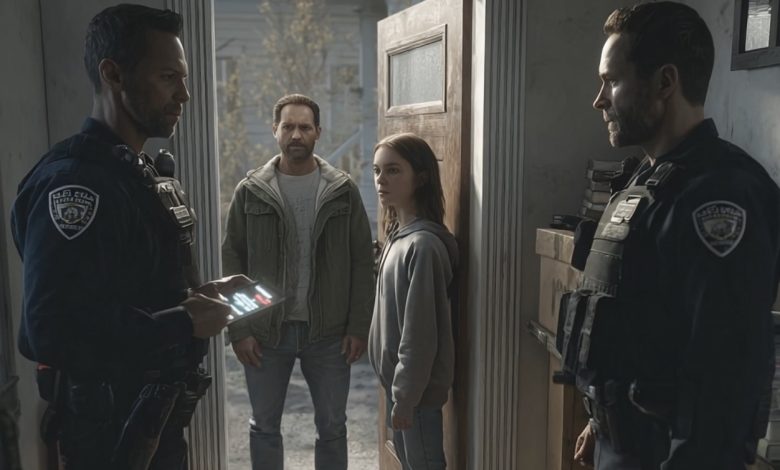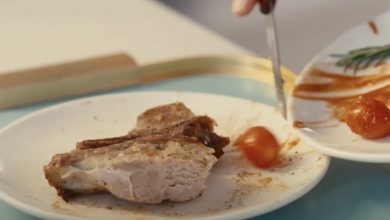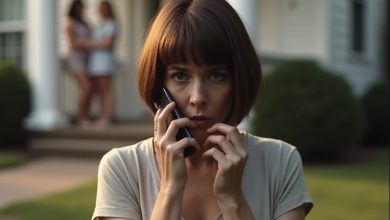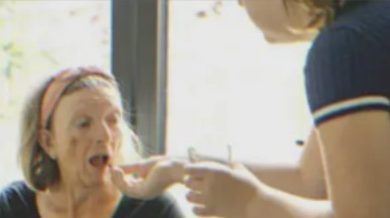On my birthday, a package arrived from my parents. As soon as my husband spotted it, he warned, “Don’t open that.” I asked him what he meant, and he said, “Can’t you tell?” I took a closer look—and stopped in my tracks.

For my birthday, my parents sent me a package. The moment my husband saw it, he warned me, “Don’t open it.” I asked, “Why not?” He simply said, “Can’t you tell?” I peered closer—and my blood ran cold. Instead of tearing it open, I did something else. Thirty minutes later, there was a knock on the door—and it wasn’t just a delivery.
I never make a fuss over my birthday. No big blowouts, no elaborate decorations—half the time I forget the date until Jason, my husband, surprises me with a little chocolate bar and cracks some cheesy joke about being “married to a woman with… experience.” That small ritual is enough to keep me happy. So when my phone buzzed the afternoon before I turned thirty-four and I saw it was my mom calling—her voice unnaturally bright—I felt a twinge of unease.
“Hi, sweetie!” she chirped, almost tripping over her own words. “We’ve sent you a little treat! It should get there just in time.”
“Just in time,” I echoed, thinking of all the times my parents were exactly on schedule—for Ellie’s school plays, for family graduations, for every little milestone of my younger sister. Anything of mine tended to get lost in their minds. Still, I didn’t want to sound ungrateful. “Thanks, Mom. That’s… nice of you.”
She let out a high-pitched giggle—an odd sound coming from her. “It’s nothing grand,” she added. “Just a small token of our love.”
That was the precise moment I should have slammed the phone down. Not because she said the words “our love,” but because she said them without her usual follow-up: reminding me how I was “too emotional” or “too needy.” But I’m human, and a foolish part of me wanted to believe that maybe, this once, they were really thinking of me. Maybe they were trying. I knew they weren’t—but hope is stubborn.
On the morning of my birthday, Jason made blueberry pancakes. He hummed along to the radio, and I watched him flip the pancakes in our cozy kitchen, feeling content. It was only when the doorbell rang that I sensed the calm would end. A simple, machine-sealed cardboard box waited on our welcome mat—no bow, no handwritten tag, nothing but plain brown cardboard, taped up by some automated system.
Jason lifted the box into the kitchen, placed it on the island, and just stared. As though it might sprout legs and walk away.
“That’s from my parents,” I said to him.
He didn’t respond.
“My mom called yesterday,” I reminded him. “She said they were sending me a gift.”
Still, he was silent. Finally he said, “Don’t open it.”
His tone was quiet, but firm. I laughed, more to hide my own uncertainty than because I found it funny. “What is this, a cursed box challenge?”
Jason didn’t crack a smile. Instead, he pointed at the shipping label. I leaned in. I saw my name and address in a stark, impersonal typeface—no cursive, no gentle curves. The return address wasn’t their home street. It was just a P.O. box. Not even in our city. I felt a cold knot form in my chest.
Jason tapped the side of the box, drawing my eyes to the tape line. “There,” he whispered. “Do you see it?”
I looked closer. It wasn’t only the label. It was the entire package’s feel: the exact sheen of the cardboard, the identical width of the tape, the barcode’s perfect alignment. Details you only notice when you’ve seen them under a bright light before. And I had: last year, at Ellie’s place, her hallway looked like a mini–fulfillment center. Boxes stacked to the ceiling, each with the same shiny finish and that faint tang of fresh glue in the air. Ellie had laughed when I examined one. “Their packager is obsessive,” she’d told me. “They record who opens which box.”
And now that same packager had sent a brand-new box directly to my house. Not reused, not forwarded—fresh from whatever warehouse they operated.
My phone buzzed again. It was Mom, calling right back. Jason shot me a look. I hesitated, then swiped to answer on speaker.
“Sweetie, did you get our package?” her voice tinkled.
“Yeah,” I said, turning away from the kitchen island. “It’s here.”
“And did you unwrap it yet?” she asked, too eagerly.
I swallowed. “I did,” I lied. “It’s beautiful. Thanks so much.”
“Oh, honey,” she cooed, “we just wanted to show you how very much we love you. You’re our girl, don’t forget that.” My stomach lurched—she had never called me “our girl.” Not at my graduation, not when I announced my engagement, not even when I cried on her couch after losing our first baby two years ago.
“We thought you deserved something special,” she continued, voice sugary. “You’re so strong.” Then she hung up before I could say another word.
The box sat between me and Jason like a silent trespasser.
“I hate how sweet she sounded,” I muttered at last.
Jason nodded. “Mom only sweet-talks when she’s getting ready to lie.”
I ran a hand through my hair. “And they never actually send me real gifts. Remember that time Ellie got a Peloton and I got a gas-station candle?”
He let out a low chuckle. “Pretty sure that candle had scorch marks.”
We stayed there in uneasy silence for a few more minutes. The box loomed on the island, daring me to do something. But the thought of cutting it open made my skin crawl.
Thirty minutes later, there came a firm knock on the front door. It wasn’t the neighbor dropping off leftover cake. It was two uniformed police officers, badges shining.
“Are you Amanda Roberts?” one of them asked.
I exchanged a quick glance with Jason, then nodded. “Yes.”
“We’ve had a report of a suspicious package delivered here,” the officer continued. “Would you mind if we came in and had a look?”
To understand how things reached this point, you have to know a bit about my family—and especially about my sister, Ellie. If I am structure and order, Ellie is chaos and tears. She’s my younger sister by three years, and our parents always treated her like she was made of porcelain. If she cried at a scraped knee, we canceled school. If she got a B-minus on a test, Mom would storm the principal’s office. Meanwhile, I learned early to swallow my anger and accept blame rather than watch Ellie’s bottom lip tremble. I was ten the first time I was blamed for something I didn’t do: a dark-green ceramic vase shattered in the hallway. Ellie stood there, tears streaming; Mom arrived and yelled; Ellie pointed at me. “Amanda did it,” she said in a clear, businesslike tone. I stayed silent. The result: I spent the afternoon in my room; Ellie got a popsicle.
As adults, we drifted into separate orbits. Ellie never went to college. She got certified in yoga, sold essential oils for a hot minute, then launched her “spiritual art” Instagram where she reposted other people’s crafts and called it her own. Miraculously, it never flopped—it just “evolved.” Our parents praised her for “finding her authentic path,” while I studied finance, built a career, and saved for a house. One holiday season, Ellie borrowed six hundred dollars from me to start her bath-bomb side hustle—and never paid me back. They always sided with her.
About a year ago, Mom called me to invite me to lunch. Ellie was already there, sipping green tea and flashing a rehearsed smile. Midway through the salad, Ellie looked at me and said, “Hey, I’m in between leases right now. Would you mind if I used your address for a business account? Just for deliveries? You’re so… stable.” That word—stable—felt like a slap. It meant boring. It meant being predictable. It meant I could be counted on to take an unwanted package.
I shook my head. “No, Ellie. I’m not comfortable with that.”
She blinked rapidly, then smiled too wide. The rest of lunch felt iced over. Soon after, the holiday card from our parents got lost in the mail… again. Dad sent me a passive-aggressive email: “Your presence is missed at the family dinner.” Ellie unfollowed me on social media. I told myself I didn’t care. Quiet is better than drama. But I never forgot how it felt to be punished for standing up for myself.
So when that box arrived—on my birthday, no less—I knew something was very wrong.
The officers stepped inside, looking at us and then at the box with professional curiosity.
“You haven’t opened it?” the taller one asked.
I shook my head. “No.”
He nodded and said, “Mind if we take a look?” His partner put on latex gloves, then carefully slit the tape with a small blade. They peeled back the flaps and revealed bubble wrap, a handful of mysterious figurines wrapped in tissue, and beneath that, a printed certificate of authenticity stamped with an official logo I didn’t recognize.
The taller officer scanned a barcode on the certificate with a handheld reader. His face went serious. He whispered something to his partner. They exchanged a look that said, Maybe we did the right thing.
“Do you know what these objects are?” he asked me.
“They look like—some kind of collectible art,” I said honestly. “I have no clue where they came from, except my parents supposedly sent them.”
“Do you have proof of that?” he pressed.
I pulled my phone out of my pocket and opened my call recording app. “You can listen for yourself,” I offered, playing Mom’s syrupy voice: We just wanted to remind you how much we love you… You’re our girl.
He let the phone rest in my hand, then said, “We’ll need to take these in for analysis. At this point, you’re not a suspect, but this shipment matches items linked to an ongoing probe.” He carefully repackaged the box and placed it in an evidence bag.
I felt strangely hollow as they left, carrying away the very object that had dragged me into this nightmare. Jason and I stood in the quiet.
“They really expected me to open it,” I said.
Jason put an arm around my shoulders. “They really did.”
That evening, as I sat on the couch, I realized how little control I’d felt growing up. My parents always decided who got to be the favored child, who got to be shielded, and who got blamed. Ellie’s tears held power; my silence cost me truth. But tonight, I had spoken up. I hadn’t torn open that box—but I had refused to be complicit. I had called the police. I had protected myself.
In the days that followed, I learned that the figurines matched dozens of mysterious thefts from galleries across the state. Each shipment went to a “trusted address” before disappearing again. Someone had tried to use me as a drop point—someone who knew too much about our family’s habits.
I never got another call from Mom. Ellie texted me once, asking if I was okay. I didn’t reply. Maybe one day I’ll tell her how it felt to realize our parents valued her tears over my honesty. But for now, I’m just grateful the police knocked when they did.
And next year, when November rolls around again, I’ll make myself a simple dinner… and I’ll definitely skip the deliveries.










